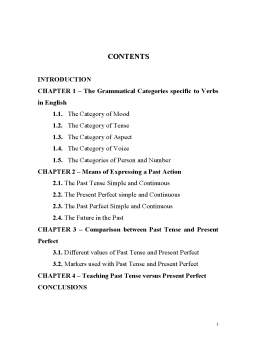Cuprins
- INTRODUCTION
- CHAPTER 1 – The Grammatical Categories specific to Verbs in English
- 1.1. The Category of Mood
- 1.2. The Category of Tense
- 1.3. The Category of Aspect
- 1.4. The Category of Voice
- 1.5. The Categories of Person and Number
- CHAPTER 2 – Means of Expressing a Past Action
- 2.1. The Past Tense Simple and Continuous
- 2.2. The Present Perfect simple and Continuous
- 2.3. The Past Perfect Simple and Continuous
- 2.4. The Future in the Past
- CHAPTER 3 – Comparison between Past Tense and Present Perfect
- 3.1. Different values of Past Tense and Present Perfect
- 3.2. Markers used with Past Tense and Present Perfect
- CHAPTER 4 – Teaching Past Tense versus Present Perfect
- CONCLUSIONS
Extras din proiect
INTRODUCTION
This project The Comparison between Past Tense and Present Perfect consists of four chapters in which are fully presented the Grammatical Categories Specific to Verbs, the Means of expressing a Past Action and also the main contrastive aspects between Past Tense and Present Perfect.
The first chapter presents a short definition of the Verb and grammatical categories specific to verbs (Mood, Tense, Aspect, Voice, Person and Number).
In the second chapter describes the means of expressing a past action (Past Tense Simple and Continuous, Present Perfect Simple and Continuous, Past Perfect Simple and Continuous, Future in the Past). The forms and uses of these tenses are illustrated with examples.
The third chapter refers to the contrastive aspects between Past Tense and Present Perfect (markers used and values).
The fourth chapter presents methodical aspects of teaching English Grammar. These aspects of teaching Past Tense versus Present Perfect are illustrated with examples and activities for intermediate level pupils.
The paper ends with conclusions that are useful in the process of teaching this grammar topic.
CHAPTER 1 - THE GRAMMATICAL CATEGORIES SPECIFIC TO VERBS IN ENGLISH
Definition of the verb
The Verb in English has traditionally been defined as a part of speech that expresses an action or a state of things. This definition is not complete because other words, especially nouns and adjectives can also express this meaning.
The most modern grammarians prefer to define word classes (or parts of speech) not only on the basis of their meaning, but also on the basis of their form, so far as this is possible and on the basis of their function in sentences.
To give a complete definition of the verb we have to take into account three criteria:
- Morphological(ly)
- Semantic
- Syntactic
Morphologically, the verb assumes certain forms to express various grammatical categories: the categories of number (which is shared with other parts of speech), person and the specific categories of tense, aspect, voice and Mood.
From the Semantic point of view (from the point of view of their meaning), the class of verbs includes words expressing actions or states as processes.
A finite verb discharges the Syntactic function of a predicate in sentence.
The Grammatical Categories of the Verb
The English verb has grammatical forms determined by its categories of Mood, tense, aspect, voice, person and number. Depending on the presence or absence of the first three categories (person, number, Tense), the verbal forms are divided into Finite and Non-Finite.
- The Finite forms of the verb are represented by all forms of the verb except infinitive(s), -ING forms (Present Participle and Gerund) and Past Participle.
A finite Verb Phrase is a Verb Phrase that contains a finite verb form.
e. g. She writes a novel.
The finite forms of the verb are required in the main clause of a sentence (main clauses contain finite verb phrases).
- The Non-Finite forms of the verb are represented by the –ING forms (Present Participle, Gerund) and –ED form (Past Participle) and the Infinitive.
A non-finite Verb Phrase is a Verb Phrase which contains one or more Non-Finite verb Forms (but no finite verb form.
e. g. Writing a novel is creative.
It is creative to write a novel.
Non-Finite verbs are generally found only in subordinate clause (termed non-finite clauses i. e clauses without a finite verb).
e. g. Feeling better, she visited her aunt.
Preview document
Conținut arhivă zip
- The Comparison between Past Tense and Present Perfect.doc











































































